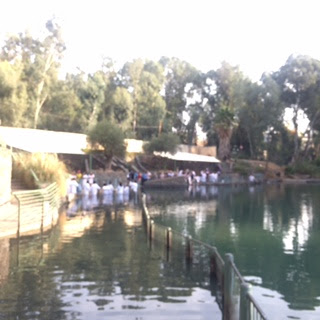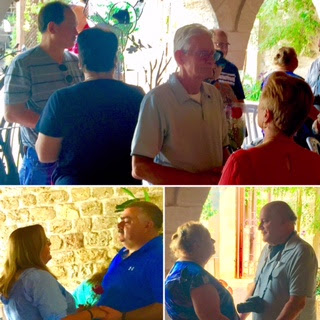“Go home to your
family and announce to them all that the Lord in his pity has done for you.”
The Gospel passage just proclaimed tells us that, having been set free
from the demons that has possessed him, the man implores he may be allowed to get
into the boat and depart with Jesus. But
the Lord tells him to “go home to his family.”
In my mind I imagine him pleading with Jesus again – “Go home to my
family? Where do you think my demons
came from?” I imagine that some gathered
here this morning, at Thanksgiving mass may be thinking the same thing as you
anticipate the day ahead.
In seriousness though, there are legitimate questions here. Why was the man’s initial instinct to get in
the boat and follow the Lord; rather then return to family and friends? Earlier in this chapter, St. Mark describes
the gravity of this man’s possession:
The man had
been dwelling among the tombs, and no one could restrain him any longer, even
with a chain. In fact, he
had frequently been bound with shackles and chains, but the chains had been
pulled apart by him and the shackles smashed, and no one was strong enough to
subdue him. Night and day
among the tombs and on the hillsides he was always crying out and bruising
himself with stones.
Because of his possession, this man’s humanity was no longer recognizable.
His shame at what he had become may very well have removed any desire he had to
face the family he once knew. In addition, wouldn’t it be hard for his family
and friends to accept such a change?
Would he still be seen as the possessed one? Such is the case in our own family
dynamics. Over the course of our lives,
we change, for better and for worse. We
might have shame for past indiscretions and old wounds. Further, while we may recognize growth and
conversion in our lives, others may refuse to do so or be unable to see those
changes. Like the formally possessed
man, our anxiety over others disbelief or lack of mercy is real and can keep us
from sharing who we have become.
So why then does the Lord not let the man remain with him? Most assuredly Jesus would have been aware of
such fears, but this moment of healing happens for this man “and for many.” Who
better to be a witness to the good God has done then one with whom we are
familiar? This man’s family and friends
knew the depth of his possession, only they could appreciate the magnitude of
the healing. Jesus heals and sends them
man back to his family so that he may be an evangelist; a bearer of good news and
a cultivator of faith. The man does as
Jesus tells him and – all were amazed. Or more literally from the Greek translation
- they all marveled and wondered. In simply
telling the story of what happened to him, the man provoked within others a
desire to know the work of God.
We give thanks today because as St. Paul says, Jesus Christ strengthens
and considers us worthy to be his ministers. [1Timothy 1:12] The word that we give to the blessed sacrament we receive today is “Eucharist;”
a Greek word meaning, thanksgiving. By
this Holy Eucharist we are strengthened so we can be bearers of the good the
Lord has done for us. Regrettably our
instinct is to keep this thanksgiving private.
We recoil from the notion of evangelization and are particularly averse
to considering ourselves one to our friends and family. But Jesus kicks us out of the comfort of this
boat and commands us, if we are truly thankful for what we receive in this
Eucharist, to go back to our families and tell them all that the Lord has done
for us.
So what am I asking us to consider today?
Am I asking you to approach the Thanksgiving table with a bible in one
hand and the catechism in the other?
Probably not a good idea. Your
family might think you are as possessed as the man in the Gospel. Let me show you a subtler way. The first pastor I served with as a priest,
liked to offer acronyms as a way of remembering his homily. So let me offer you one to guide you
today. Using the first letter of words
taken from this morning’s scriptures I offer you the acronym LAFTR, L-A-F-T-R, LAFTR
Love – In first reading the prophet Isaiah
tells us, because of love, the Lord redeems.
We are called to tell love stories.
Not just tales of romance, but the ways in which love, or our passion
for someone, or something, brought about change in our life.
Amazed – The people were amazed at the
man’s story in the Gospel and therefore pondered this divine intervention. What ability, talent, skill or act of kindness
have you observed in someone or even yourself?
Find an opportunity to share your wonder and awe, allowing another to be
aware of mystery that comes from the divine presence.
Faithful – In the second reading St. Paul tells us that God is faithful to us. So often we tell the tales of infidelity. We repeat gossip or relate how we’ve been
wronged. A story of another’s faithfulness can counter that negative
inclination and restore hope in the fidelity of God and those he sends into our
lives.
Thanks – While this one might seem obvious, remember how St. Paul begins
that second reading, “I give thanks to my
God always on your account for the grace of God bestowed on you in Christ Jesus.” We can so quickly point out flaws in the
other. St. Paul give thanks for the gifts
of God that he observes in the people.
In so doing he shows us how necessary it is to acknowledge the good we see
in the other. This is particularly
important to offer to those who lack esteem and self-worth.
Recall – The passage from Isaiah begins
with his commitment to recall the loving deeds and acts of God. How many of our gatherings of family and
friends devolve into the rehashing of old arguments or past mistakes? Instead recall a shared memory of the good of
your lives, the blessings you have encountered and the joy you have shared.
Positive recollection transforms that inclination to dwell on the negatives of
the past and instead establishes hope in remembering the good the Lord has done
for us.
As you go back to your families today, in a moment when the attention
turns to you or better yet, if you have the courage to initiate a conversation,
interject some LAFTR - love, amazement, faith, thanks, recall - and be the thankful
evangelist the Lord has called you to be.
In his proclamation that created the national Thanksgiving holiday in
1863, amidst the Civil War, President Lincoln, asked the Almighty to heal the
wounds of the nation & restore peace, harmony, tranquility &
union. It is with the very same desire
that we go forth from the Lord’s Table today.
We need to be bearers of Good News at our Thanksgiving tables
today.
A CNN poll has found that 53% of
Americans dread the idea of talking about the Presidential election over dinner
today. There are also found numerous
articles online suggesting topics other than the election to be discussed at
family gatherings, so as to avoid strife.
There is a need for healing and not more animosity in our world. So I pray that as a result of the strength we
receive in this Holy Eucharist, this sacred thanksgiving; we may be grateful for
the opportunity to go home to our families, enjoy the blessing of a meal shared
and through LAFTR announce to all, the good the Lord has done in us.
Happy Thanksgiving.



















































